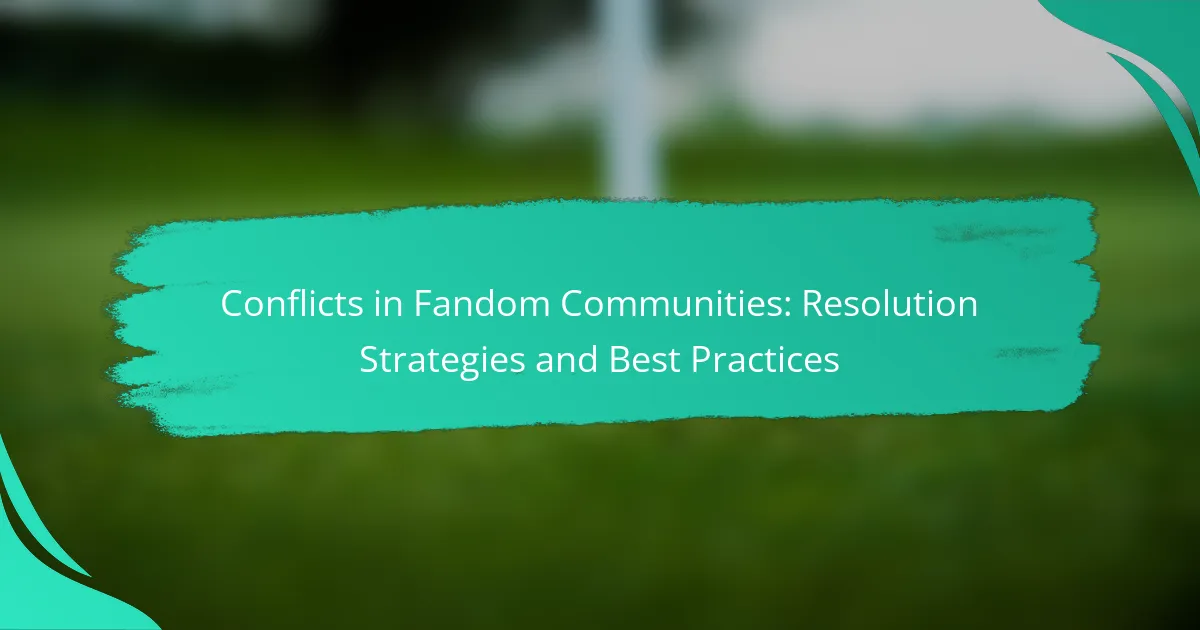Conflicts within fandom communities are inevitable, but effective resolution strategies can transform disputes into opportunities for growth and understanding. By fostering an environment of respect and collaboration, community leaders can ensure that all voices are heard and valued. Utilizing digital platforms enhances these efforts, providing essential tools for communication and conflict management.
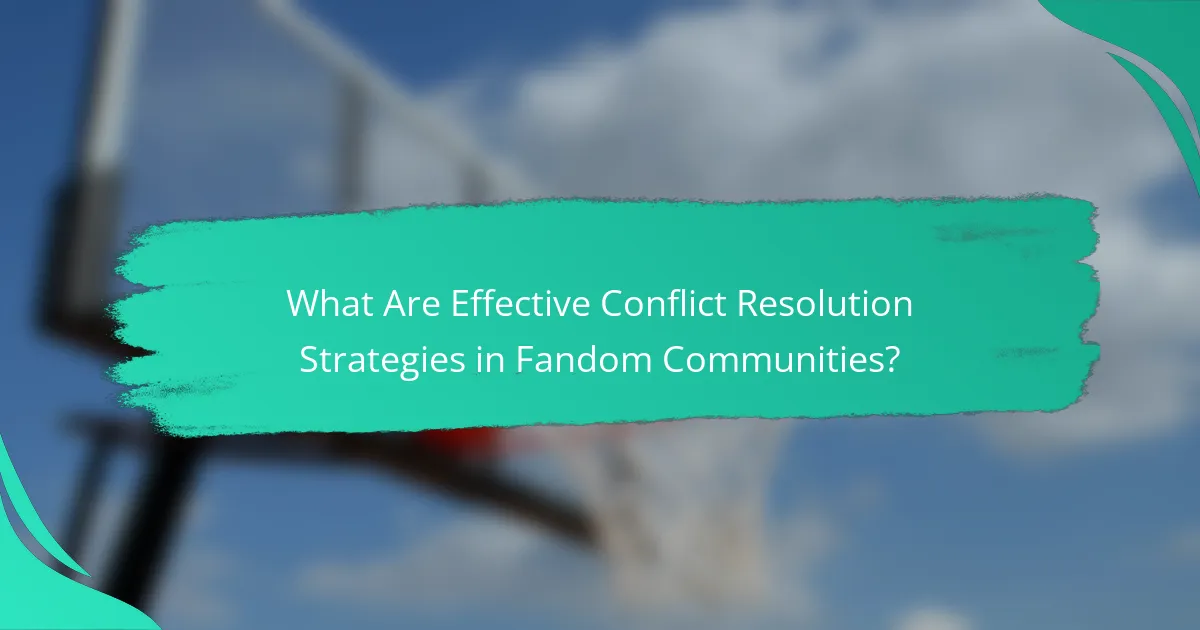
What Are Effective Conflict Resolution Strategies in Fandom Communities?
Effective conflict resolution strategies in fandom communities focus on fostering understanding and collaboration among members. These strategies aim to address disputes constructively, ensuring that all voices are heard and respected.
Mediation Techniques
Mediation techniques involve a neutral third party facilitating discussions between conflicting members. This approach helps clarify misunderstandings and encourages compromise. Mediators should be trained in conflict resolution to effectively guide conversations and maintain a respectful environment.
Consider using structured mediation sessions where each party has equal time to express their views. This can prevent escalation and promote empathy, allowing for a more amicable resolution.
Community Guidelines Enforcement
Enforcing community guidelines is essential for maintaining a respectful atmosphere. Clear rules should outline acceptable behavior and the consequences for violations. Regularly revisiting these guidelines can help reinforce their importance and ensure all members are aware of them.
Establish a transparent process for reporting and addressing conflicts. This could include a dedicated team responsible for investigating complaints and applying appropriate sanctions, which might range from warnings to temporary bans, depending on the severity of the issue.
Open Dialogue Sessions
Open dialogue sessions create a platform for members to discuss issues openly and constructively. These sessions should be scheduled regularly and promoted as safe spaces where all participants can share their thoughts without fear of backlash.
Encourage participation by setting specific topics for discussion and allowing anonymous submissions for those who may feel uncomfortable speaking up. This can lead to a deeper understanding of differing perspectives and foster community cohesion.
Conflict Resolution Workshops
Conflict resolution workshops equip community members with the skills needed to handle disputes effectively. These workshops can cover topics such as communication techniques, active listening, and negotiation strategies.
Consider hosting these workshops quarterly, inviting both experienced members and newcomers. This not only builds skills but also strengthens relationships within the community, creating a more resilient environment for future conflicts.
Peer Support Groups
Peer support groups provide a space for individuals to share their experiences and seek guidance from others who have faced similar challenges. These groups can help members feel less isolated and more empowered to address conflicts constructively.
Establish regular meetings for these groups, ensuring they are facilitated by someone trained in conflict resolution. This can help maintain a supportive atmosphere and encourage members to develop their conflict management skills collaboratively.
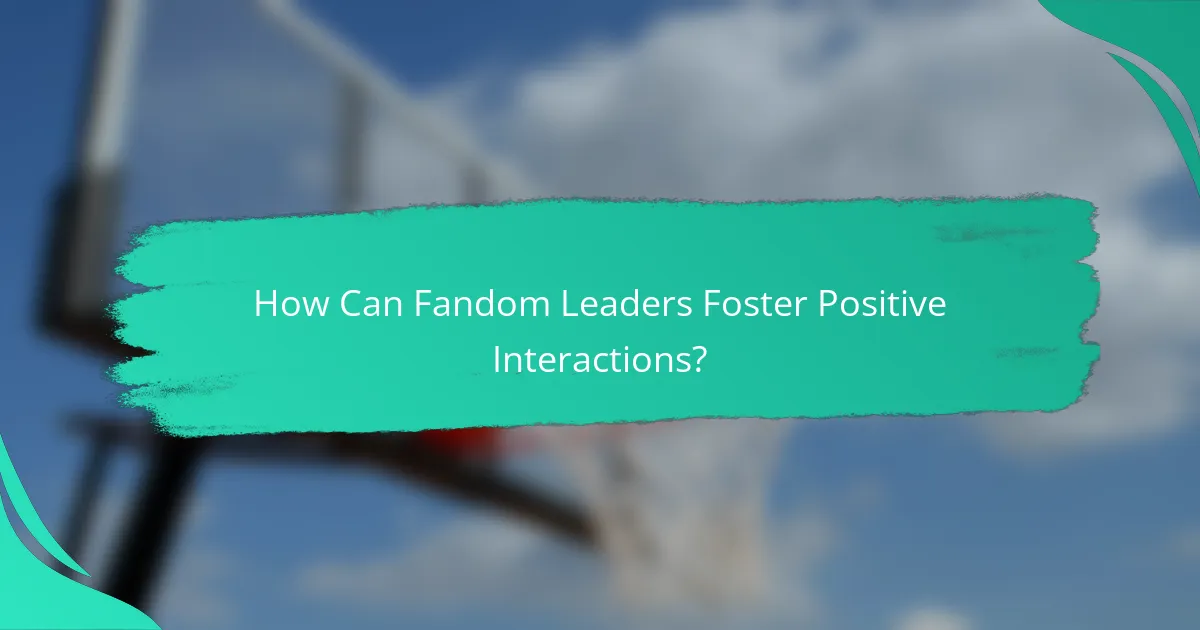
How Can Fandom Leaders Foster Positive Interactions?
Fandom leaders can foster positive interactions by creating an environment that encourages respect, understanding, and collaboration among community members. This involves implementing strategies that promote inclusivity, clear communication, and recognition of positive contributions.
Encouraging Inclusivity
Inclusivity is vital for fostering a welcoming fandom community. Leaders should actively promote diverse voices and perspectives, ensuring that all members feel valued and heard. This can be achieved through initiatives like open forums, where fans from various backgrounds can share their experiences and ideas.
Consider hosting events that celebrate different cultures and identities within the fandom. For example, themed discussions or collaborative projects can highlight unique contributions, helping to build a sense of belonging among all participants.
Establishing Clear Communication Channels
Clear communication channels are essential for preventing misunderstandings and conflicts. Fandom leaders should establish multiple platforms for dialogue, such as dedicated forums, social media groups, and regular meetings. This variety allows members to choose the medium they are most comfortable with.
It’s important to set guidelines for respectful communication. Leaders can create a code of conduct that outlines acceptable behavior and consequences for violations. This helps maintain a positive atmosphere and encourages members to engage constructively.
Recognizing and Rewarding Positive Contributions
Recognizing and rewarding positive contributions can motivate community members to engage more actively. Leaders should implement systems for acknowledging individuals who go above and beyond, whether through shout-outs in community newsletters or small rewards like badges or titles.
Consider creating a monthly spotlight feature that highlights outstanding contributions, such as fan art, thoughtful discussions, or helpful resources. This not only boosts morale but also encourages others to participate and contribute positively to the community.
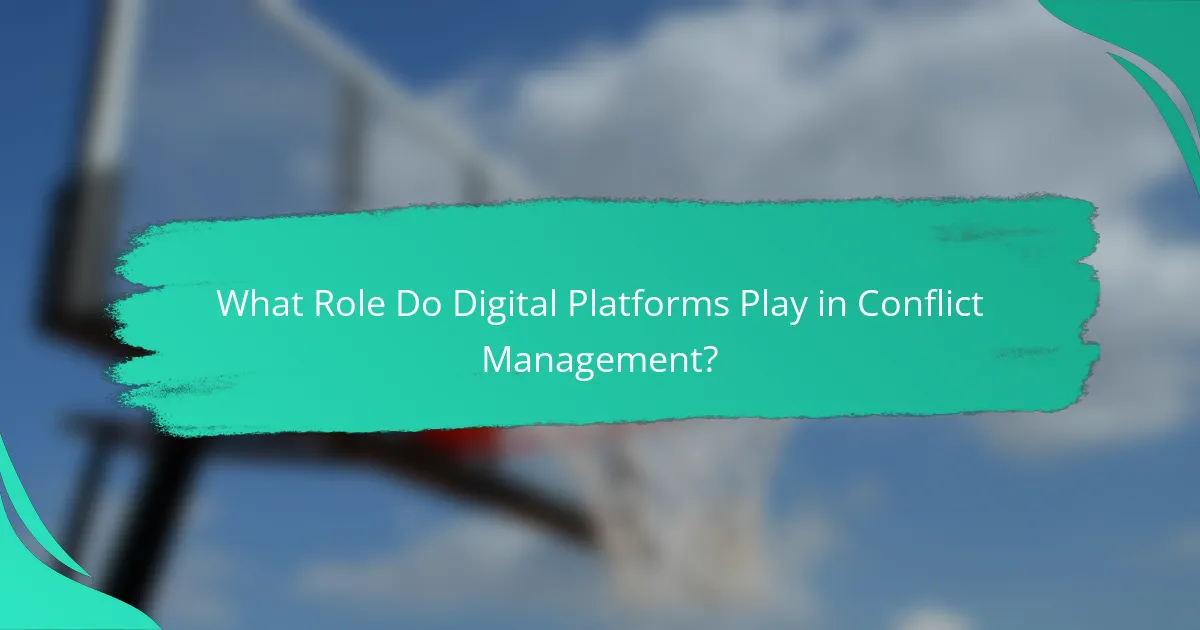
What Role Do Digital Platforms Play in Conflict Management?
Digital platforms are essential in managing conflicts within fandom communities by providing tools and features that facilitate communication and resolution. These platforms enable users to report issues, moderate discussions, and implement community guidelines effectively.
Moderation Tools on Discord
Discord offers various moderation tools that help manage conflicts in real-time. Server administrators can use features like muting, kicking, or banning users who violate community rules, ensuring a safe environment for all members.
Additionally, bots can automate moderation tasks, such as filtering inappropriate content or issuing warnings. This allows for quick responses to conflicts, reducing escalation and maintaining a positive community atmosphere.
Conflict Reporting Features on Reddit
Reddit provides users with conflict reporting features that allow them to flag inappropriate content or behavior. Users can report posts or comments that violate subreddit rules, prompting moderators to review and take necessary actions.
This system encourages accountability and fosters a respectful environment, as users know they can report issues without fear of retaliation. However, it’s crucial for moderators to act fairly and transparently to maintain trust within the community.
Community Management Software
Community management software offers comprehensive solutions for conflict management across various platforms. These tools can include analytics, user engagement tracking, and automated moderation features, helping community leaders identify and address issues proactively.
When selecting community management software, consider factors such as ease of use, integration capabilities, and the specific needs of your fandom. Utilizing these tools effectively can enhance community cohesion and reduce the likelihood of conflicts arising.
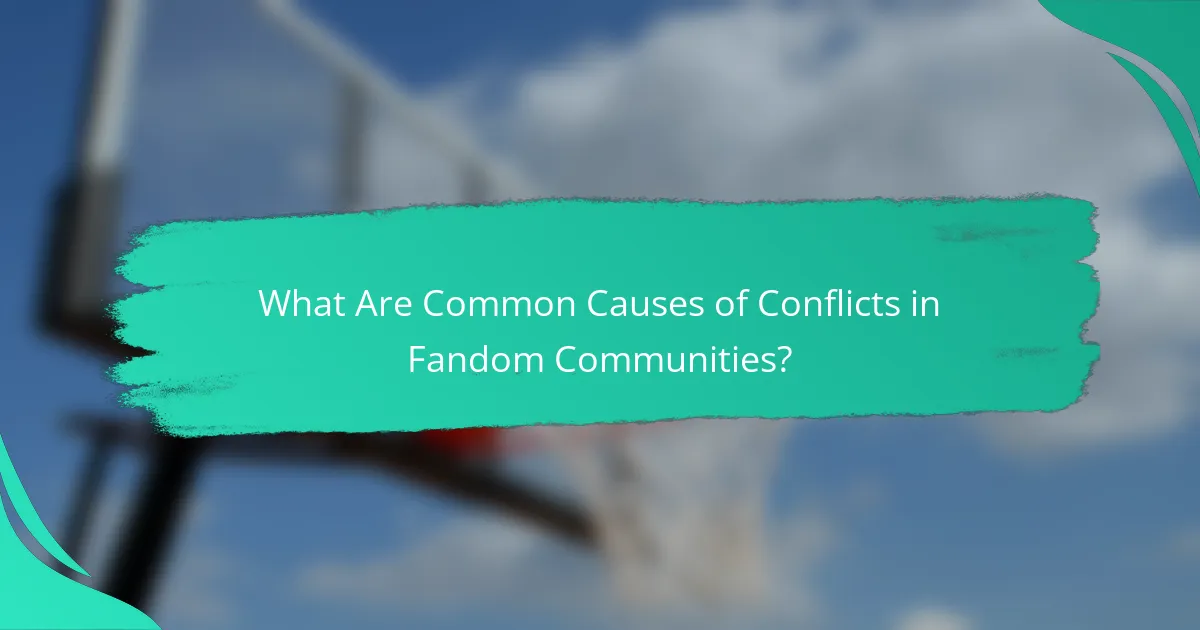
What Are Common Causes of Conflicts in Fandom Communities?
Conflicts in fandom communities often arise from differing opinions, personal interactions, and behaviors that can alienate members. Understanding these causes is essential for fostering a more harmonious environment.
Disagreements Over Canon
Disagreements over canon refer to differing interpretations of the official storyline or character development within a fandom. Fans may have strong opinions about what constitutes “true” canon, leading to heated debates and divisions.
For example, in a popular fantasy series, some fans may argue that a character’s actions in a specific book are definitive, while others may interpret them differently based on supplementary materials. These conflicts can escalate if fans feel their views are invalidated.
To mitigate these disputes, it’s helpful to encourage respectful discussions and establish guidelines for how canon is referenced in conversations, allowing for diverse interpretations without hostility.
Personality Clashes
Personality clashes occur when individuals within a fandom have incompatible communication styles or values. These differences can lead to misunderstandings and conflicts that disrupt community cohesion.
For instance, a fan who is outspoken and assertive may unintentionally alienate a more reserved member, causing friction. It’s crucial for community leaders to recognize these dynamics and promote an inclusive atmosphere.
Encouraging empathy and understanding can help bridge gaps between different personalities. Setting up forums for open dialogue can also provide a space for fans to express their thoughts without fear of conflict.
Exclusionary Behavior
Exclusionary behavior involves actions or attitudes that marginalize certain fans based on their interests, backgrounds, or levels of knowledge. This can create a toxic environment where some members feel unwelcome or undervalued.
For example, a group may dismiss newcomers or those who enjoy less popular aspects of a franchise, leading to feelings of isolation. Such behavior can deter participation and damage community spirit.
To combat exclusion, fandoms should actively promote inclusivity by celebrating diverse interests and encouraging all members to share their perspectives. Establishing clear codes of conduct that discourage exclusionary practices can also foster a more welcoming environment.
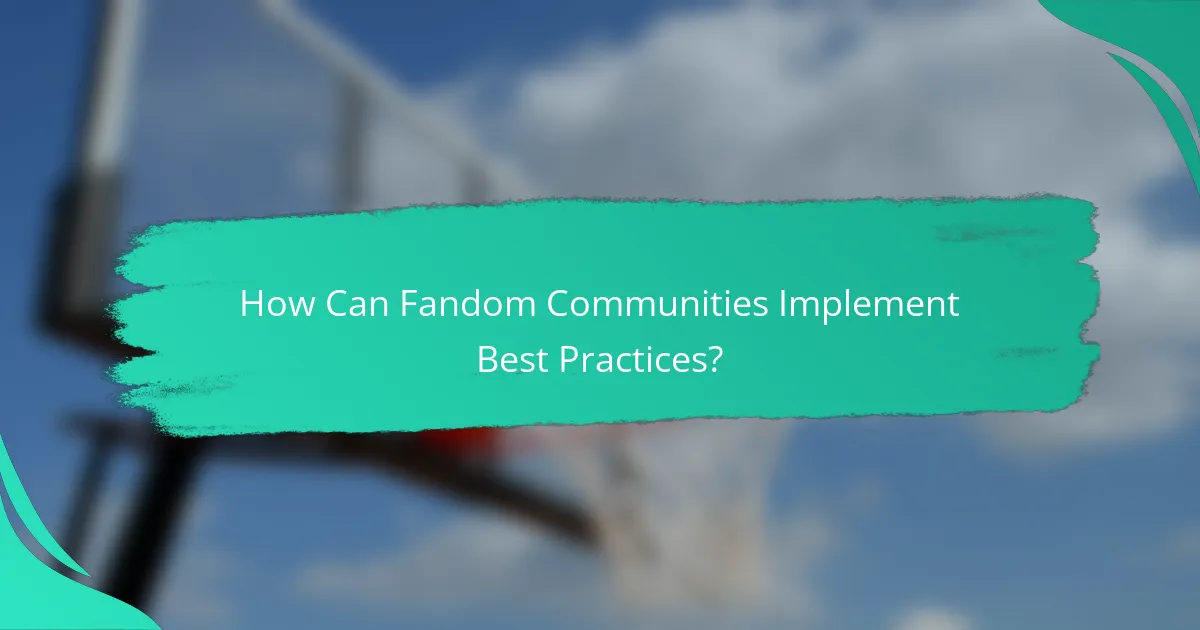
How Can Fandom Communities Implement Best Practices?
Fandom communities can implement best practices by establishing clear guidelines and fostering open communication. These strategies help create a respectful environment where conflicts can be resolved constructively.
Creating Comprehensive Code of Conduct
A comprehensive code of conduct is essential for setting the tone of a fandom community. It should outline acceptable behaviors, define harassment, and specify consequences for violations. This document should be easily accessible and regularly reviewed to ensure it remains relevant.
Involving community members in the creation of the code can enhance buy-in and adherence. Consider including examples of both acceptable and unacceptable behaviors to clarify expectations.
Regular Community Feedback Loops
Establishing regular feedback loops allows community members to voice their concerns and suggestions. This can be achieved through surveys, discussion threads, or periodic meetings. Feedback should be actively sought and visibly acted upon to demonstrate that community input is valued.
Consider implementing anonymous feedback options to encourage honest responses. Regularly scheduled feedback sessions, perhaps quarterly, can help maintain an ongoing dialogue about community health and dynamics.
Training for Moderators
Training for moderators is crucial to ensure they effectively manage conflicts and enforce community guidelines. Training should cover conflict resolution techniques, communication skills, and the specifics of the community’s code of conduct. This equips moderators to handle disputes fairly and consistently.
Consider providing ongoing training opportunities, such as workshops or refresher courses, to keep moderators updated on best practices. Peer support groups among moderators can also foster a collaborative approach to conflict management.
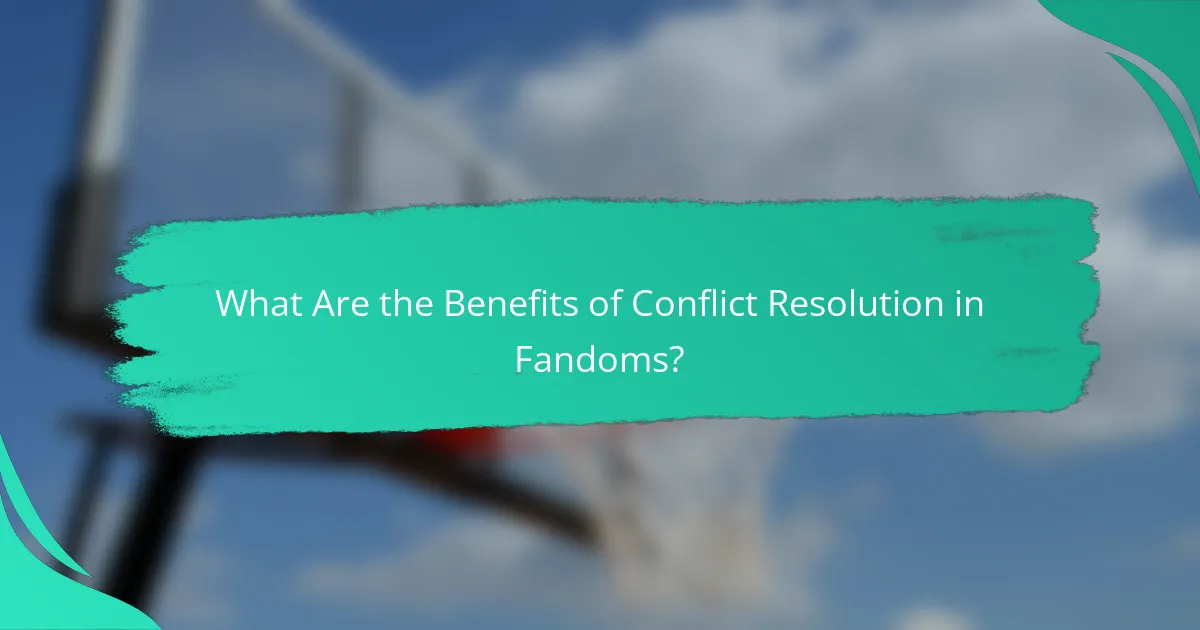
What Are the Benefits of Conflict Resolution in Fandoms?
Conflict resolution in fandoms fosters a healthier environment where members can express differing opinions without hostility. By addressing disputes constructively, communities can enhance relationships and maintain engagement among fans.
Improved Community Cohesion
Resolving conflicts effectively leads to stronger bonds within fandoms, as members feel heard and valued. When disputes are handled well, it reduces feelings of isolation and promotes a sense of belonging among fans.
To achieve improved cohesion, fandoms should establish clear communication channels and encourage open dialogue. Regular community meetings or forums can provide a platform for discussing issues before they escalate.
Additionally, recognizing and celebrating diversity within the community can enhance cohesion. Fostering an inclusive atmosphere where all voices are respected helps to unify members and strengthen the overall community fabric.
